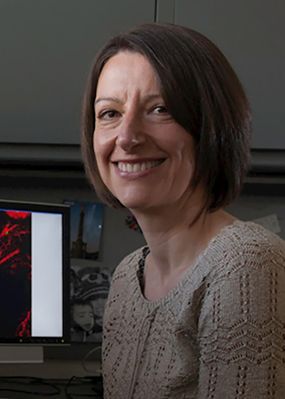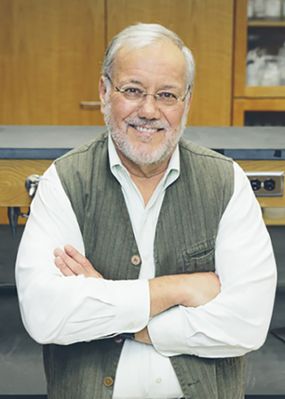Four NatSci faculty members named University Distinguished Professors
Four Michigan State University College of Natural Science (NatSci) faculty members – Federica Brandizzi, Joseph S. Krajcik, Robert L. Last, and Kenneth M. Merz, were among 11 MSU faculty members named University Distinguished Professors this year by the MSU Board of Trustees in honor of their achievements in research, teaching and mentoring, and community engagement.

Credit: University Communications
The Board of Trustees voted and approved the faculty members to receive this honor following recommendations from the provost and president during its June 18 meeting. Being named a University Distinguished Professor (UDP) is one of the highest honors that can be bestowed on a faculty member by the university.
UDP awardees have superior teaching skills that encompass the breadth and depth of their discipline, a distinguished record of public service, and scholarly, creative, and artistic achievements. The title is permanent for the duration of a recipient’s service at MSU and includes an annual stipend for five years to support professional activities.
“On behalf of the college, I would like to congratulate these four outstanding faculty members who are truly deserving of the prestigious title of University Distinguished Professor,” said Phil Duxbury, NatSci dean. “They are all exceptional researchers and teachers of fundamental science, ranging from the plant sciences, including secretory pathway mechanisms related to plant growth and stress response [Brandizzi] and the regulation of biosynthetic pathways of importance to flowering plants and the animals that depend on them [Last], to the interface between computational sciences and biology [Merz] and improving science teaching and learning practices in STEM education [Krajcik]. They have achieved the highest levels of distinction in their fields, while also providing strong leadership within MSU and at the national and international levels.”
The newly named University Distinguished Professors from the College of Natural Science are:

Credit: University Communications
Federica Brandizzi, MSU Foundation Professor, Department of Plant Biology; MSU-DOE Plant Research Laboratory; science director, Great Lakes Bioenergy Research Center (GLBRC), is a recognized scholar on the biological questions surrounding the role of plant cell endomembranes in response to stress and developmental clues.
One of Brandizzi’s recent projects is supported by a five-year (2020-2025), $1.95 million National Institutes of Health grant. With this grant, the Brandizzi Lab is expanding its exploration of protein folding within plant cells, paving the way to more effective treatments of human diseases caused by misfolded proteins, such as diabetes, Alzheimer’s and cancer. Using advanced chemical genomics and gene network analyses, Brandizzi’s lab will characterize the signaling pathways of the endoplasmic reticulum that, among other things, monitors protein folding inside cells.
“I am honored and feel privileged to be named an MSU University Distinguished Professor,” Brandizzi said. "This is recognition of many years of hard work, dedication to the plant sciences and education of the next generation of scientists. Receiving this award would have not been possible without the partnership of an extraordinary research team, my department, and the greater MSU community. I am thankful far beyond what words can express.”

Credit: University Communications
Joseph S. Krajcik, Lappan-Phillips Professor of Science Education and director of the CREATE for STEM Institute, (jointly administered by NatSci and College of Education), is a recognized leader in reforming science teaching practices to promote students’ engagement in and learning of science through the design, development and testing of project-based science-learning environments. His research on improving science-education practices is recognized internationally.
Krajcik’s recent studies of problem-based learning (PBL) in grade school children have revealed that PBL expands students' understanding of scientific concepts as well as their social-emotional skills. In PBL classrooms, students spend time developing compelling questions, designing research projects and working with other students to find solutions to problems or challenges, as opposed to learning from textbooks. Improved learning of scientific concepts were noted in third graders. Krajcik’s research showed that compelling phenomena is at the center of student learning, with students learning to use scientific practices and other skills to help make sense of the problem they are solving.
“Michigan State University is a premier land-grant university that serves the State of Michigan and the Nation through research, teaching, and service,” Krajcik said. “As such, I am honored that the MSU Board of Trustees has recognized my work to improve the teaching and learning of science through research and innovation by recognizing me as an MSU University Distinguished Professor.”

Credit: University Communications
Robert L. Last, Barnett Rosenberg Professor of plant biology, Department of Biochemistry and Molecular Biology (BMB); Department of Plant Biology, studies the evolution of proteins and their structure and function in plants, using genetic, genomic and biochemical approaches to understand the regulation of biosynthetic pathways of importance to flowering plants and the animals that depend on plants for sustenance.
One of Last’s current research projects, funded by NSF and conducted collaboratively with faculty in BMB and plant biology, is on chloroplast phenomics and focuses on the functional analysis of several thousand nuclear genes that encode chloroplast-targeted proteins. The results of these studies will provide information about the functions of individual genes and their relationships to one another. They will also enable a systems-level understanding of the networks controlling chloroplast function.
“It is especially meaningful to be recognized by trainees and peers,” Last said. “I am grateful to family as well as past and current laboratory group members, collaborators and colleagues at MSU and around the world for their support and encouragement over the decades. MSU is a great environment for plant biology research and training, and the departments and College of Natural Science have provided strong encouragement and support for our research and outreach activities.”

Credit: Harley J. Seeley
Kenneth M. Merz, Joseph Zichis Chair in Chemistry in the Department of Chemistry, with a joint appointment in the Department of Biochemistry and Molecular Biology, focuses his research at the interface between the computational sciences and biology toward developing improved materials for things, such as energy storage and drug discovery. This research requires developing theoretical and computational tools with which to explore their application to biological problems being explored, some of which include structure and ligand-based drug design, and mechanistic enzymology and model verification and validation. Quantum mechanics (QM), the theory that describes the physical properties of nature on the atomic and subatomic scale and is the basis for molecular and materials scientists who develop these useful, futuristic products, is central to Merz’s work.
One of the challenges in Merz’s research is that the QM calculations used to describe the many properties of molecules and the materials they make up require significant computer power. To address this issue, a small team of postdoctoral scholars led by Merz and Andreas Goetz (UC, San Diego) has developed software that takes advantage of powerful graphics processing units for these complex QM calculations of molecules.
The software enables researchers to address problems that would otherwise be computationally intractable in a range of research areas, such as computational materials design, catalyst design and drug design. Merz explained that the code could also be used in a high-throughput fashion to generate data for Artificial Intelligence-based molecular design approaches, such as developing improved materials and drugs
“It is very flattering to be recognized by my colleagues and my former students at MSU as a Distinguished University Professor,” Merz said. “I hope I can use this recognition to further advance MSU’s reputation by forging connections both on campus and outside of MSU.”
The new titles are effective immediately. A reception to honor the newly appointed University Distinguished Professors will be held on Nov. 18, 2021.
Banner image: Four MSU College of Natural Science faculty members – Federica Brandizzi, Joseph S. Krajcik, Robert L. Last, and Kenneth M. Merz, were among 11 MSU faculty members named University Distinguished Professors this year by the MSU Board of Trustees in honor of their achievements in research, teaching and mentoring, and community engagement. A reception to honor the newly appointed University Distinguished Professors will be held on Nov. 18, 2021.